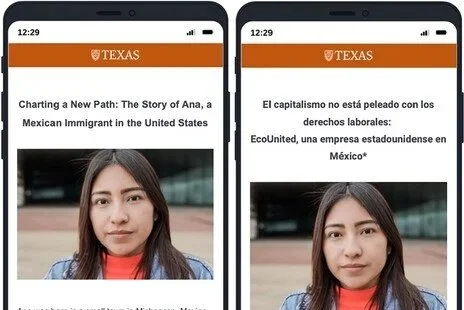Research Projects
Aging, Chronic Illness, and Border Health
We explore how aging, chronic illness, and structural inequality intersect to shape health outcomes for older adults in Mexico and the US. Drawing on large-scale survey data and national health records, the work highlights how geographic location—particularly rural settings and border regions—can exacerbate vulnerabilities related to dementia, diabetes, and comorbid conditions. The findings reveal that older adults in underserved areas face significant barriers to care, including higher out-of-pocket costs, limited access to specialized services, and greater dependence on informal caregiving networks.
Publications:
Do Older Mexican Americans With Dementia Benefit From Living Closer to the Border? Evidence From the HEPESE. Hispanic Journal of Behavioral Science Special Issue: Latinos Living with Dementia (2025), Alfonso J. Rojas Alvarez, Anna Bokun. Link.
A comparison of rural–urban differences in out-of-pocket expenses among older Mexicans with diabetes Front Public Health (2022), Alfonso J. Rojas Alvarez, Christian Vasquez, Mariana Lopez-Ortega, Jacqueline Angel. Link.
Profile and Disparities in Health Outcomes for Older Adults with Dual Diagnoses of Diabetes and Alzheimer’s Disease. Alfonso J. Rojas Alvarez, Hyeran Chung, Jose Eduardo Cabrero Castro, Emre Umucu. [Under review]
Loneliness among Older Adults with Multiple Chronic Conditions: Exploring Disparities for Hispanic Adults in the 2023 Behavioral Risk Factor Surveillance System. Derek Falk, Alfonso J. Rojas Alvarez, Deborah Parra-Medina, Christian Vazquez. [Under review]
Disparities in Healthcare Utilization for Older Adults with Diabetes and ADRD in the US-Mexico border. Alfonso J. Rojas Alvarez, Hyeran Chung, Jose Eduardo Cabrero Castro, Brian Downer. [Working paper]
Medicaid Expansion and Coverage Loss
We investigate the health and policy consequences of social program expansion and retrenchment for vulnerable Hispanic populations in the US, with a particular focus on pre-retirement adults and border communities. Using national and local survey data, we reveal how Medicaid expansion under the ACA improved health coverage among low-income Hispanics. In contrast, recent cuts in Medicaid and SNAP benefits have led to measurable declines in mental and physical health. These findings are further connected to broader questions of political engagement, showing that reductions in food assistance not only harm health but also influence patterns of civic participation.
Publications:
The Health Effects of Medicaid and SNAP Retrenchment in a US-Mexico Border County. Alfonso Rojas Alvarez, Amy Wagler, Gregory Schober. [Under review]
Did Medicaid Expansion Increase Health Coverage among Older Pre-Retirement Hispanics? Evidence from the American Community Survey. Alfonso Rojas Alvarez, Carlos Moreno-Jaimes, Felicia Knaul, Jacqueline Angel. [Under review]
Food Assistance Reductions, Health, and Pathways to Policy Feedback. Gregory Schober, Alfonso Rojas Alvarez. [Under review]
Other Policy Evaluation
Mexico Rural Health Assessment
This project centers on a comprehensive health needs assessment of low-income and rural communities in Mexico, with a particular focus on the intersection of housing, environment, and health. Through a mixed-methods approach—including household surveys, focus groups, key informant interviews, environmental sampling, and intensive case studies—we identify how structural conditions such as poor housing, air and water quality, and agricultural practices contribute to chronic illness, mental health challenges, and barriers to care.
Publications:
The Intersection Between the Dwelling Environment and Health and Wellbeing in Impoverished Rural Puebla, Mexico Journal of Rural Studies 84 (2021), Peter Ward, Andrea Sandoval, Alfonso J. Rojas Alvarez, Melanie Ruiz. Link.
Understanding community health needs and forging an academic global health partnership in Puebla, Mexico: a mixed-methods study The Lancet Global Health 8 S13 (2020), Veronica Remmert, Christina Ciaburri, Andrea Sandoval, Claire Stephenson, Alfonso J. Rojas Alvarez, Eder Hernandez, Luis Hernandez, Peter Ward, Ricardo Ainslie, Tim Mercer. Link.
Health and housing: a comprehensive community health needs assessment of low-income communities in Puebla, Mexico Journal of General Internal Medicine 35 (2020), Tim Mercer, Veronica Remmert, Luis Hernandez, Eder Hernandez, Christina Ciaburri, Andrea Flores, Claire Stephenson, Alfonso J. Rojas Alvarez, Peter Ward, Ricardo Ainslie. Link.
Policy Elites and Binational Cooperation
We investigate how political polarization shapes the future of binational cooperation between Mexico and the United States, with a focus on foreign policy and immigration. Drawing on original survey and experimental data from graduate students in policy-related fields, we explore how partisan identity influences perceptions of the neighboring country and preferences for collaboration. Findings reveal that polarization not only affects how future policy elites view cross-border challenges but also how they might respond to efforts aimed at fostering mutual understanding in an increasingly divided political landscape.
Publications:
Political Polarization and the Binational Agenda in Mexico and the United States Latin American Policy 16 3 (2025), Carlos Moreno-Jaimes, Alfonso J. Rojas Alvarez. Link.
Immigration, priming and policy collaboration: evidence from a Mexico-United States Policy Survey, 2024. Cogent Social Sciences 11 1 (2025), Alfonso J. Rojas Alvarez, Carlos Moreno-Jaimes. Link.
Pollution as a Health Policy Priority
Examination of the short-term relationship between air pollution and public safety in Medellín, Colombia, using data from 2017 to 2019. By analyzing daily incident reports alongside PM2.5 pollution levels, we identify a consistent positive correlation between air quality deterioration and increases in both violent and property-related incidents. The findings offer empirical evidence that environmental improvements may yield public safety benefits, providing policymakers with a valuable tool for evaluating the broader social impacts of air quality interventions in urban Latin America.
Publications:
Air Pollution and Safety Incidents: A Health Policy Case Study with Property and Violent Incidents in Medellín, Colombia, 2017-2019 International Journal of Urban Sustainable Development 17 1 (2025), Alfonso J. Rojas Alvarez. Link.





